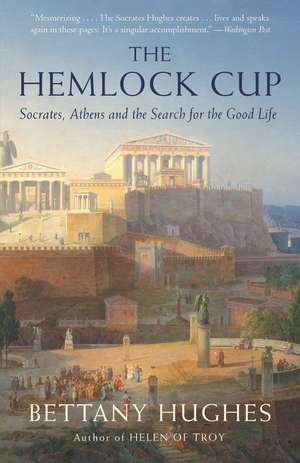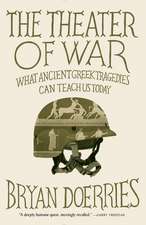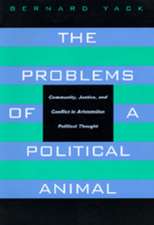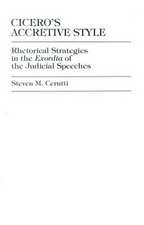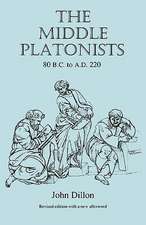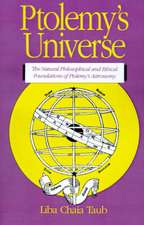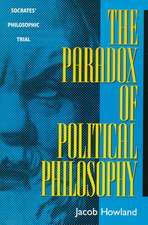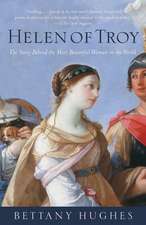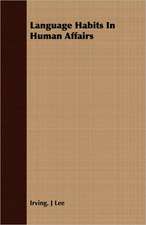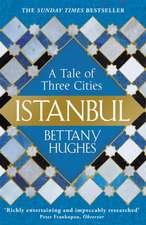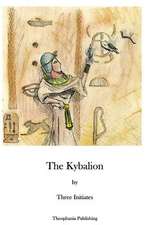The Hemlock Cup: Socrates, Athens and the Search for the Good Life
Autor Bettany Hughesen Limba Engleză Paperback – 31 ian 2012
We think the way we do because Socrates thought the way he did; in his unwavering commitment to truth and in the example of his own life, he set the standard for all subsequent Western philosophy. And yet, for twenty-five centuries, he has remained an enigma: a man who left no written legacy and about whom everything we know is hearsay. His life spanned “seventy of the busiest, most wonderful and tragic years in Athenian history.” Athens in the fifth century B.C. was a city devastated by war, but, at the same time, transformed by the burgeoning process of democracy. Drawing on the latest sources—archaeological, topographical, and textual—Hughes re-creates the streets where Socrates walked, to place him there, and to illuminate for us the world as he experienced it.
She takes us through the great, teeming Agora—the massive marketplace, the heart of ancient Athens—where Socrates engaged in philosophical dialogue and where he would be condemned to death. We visit the battlefields where he fought, the red-light district and gymnasia he frequented and the religious festivals he attended. We meet the men and the few women—including his wife, Xanthippe, and his “inspiration” and confidante, Aspasia—who were central to his life. We travel to where he was born and where he died. And we come to understand the profound influences of time and place in the evolution of his eternally provocative philosophy.
| Toate formatele și edițiile | Preț | Express |
|---|---|---|
| Paperback (2) | 92.59 lei 23-34 zile | +36.10 lei 7-13 zile |
| Vintage Publishing – sep 2011 | 92.59 lei 23-34 zile | +36.10 lei 7-13 zile |
| VINTAGE BOOKS – 31 ian 2012 | 132.95 lei 3-5 săpt. |
Preț: 132.95 lei
Nou
Puncte Express: 199
Preț estimativ în valută:
25.44€ • 27.72$ • 21.44£
25.44€ • 27.72$ • 21.44£
Carte disponibilă
Livrare economică 02-16 aprilie
Preluare comenzi: 021 569.72.76
Specificații
ISBN-13: 9781400076017
ISBN-10: 1400076013
Pagini: 484
Ilustrații: 16 PP.COLOR; 5 MAPS ILLUSTRATIONS IN TEXT
Dimensiuni: 133 x 203 x 29 mm
Greutate: 0.48 kg
Editura: VINTAGE BOOKS
ISBN-10: 1400076013
Pagini: 484
Ilustrații: 16 PP.COLOR; 5 MAPS ILLUSTRATIONS IN TEXT
Dimensiuni: 133 x 203 x 29 mm
Greutate: 0.48 kg
Editura: VINTAGE BOOKS
Notă biografică
Bettany Hughes is an award-winning historian, author and broadcaster. Her first book, Helen of Troy, has been translated into ten languages. She has written and presented numerous documentaries for the BBC, PBS, the Discovery Channel, the History Channel and National Geographic, which have been seen by more than 100 million viewers worldwide. She received her degrees in ancient and medieval history from Oxford University and holds a Research Fellowship at King’s College, London. She was awarded the 2012 Norton Medlicott Medal for Services to History by the Historical Association. She was awarded the 2012 Norton Medlicott Medal for Services to History by the Historical Association. She lives in the United Kingdom and abroad with her husband and their two daughters.
Extras
Introduction
The unexamined life is not a life worth living for a human being.
--Socrates, in Plato’s Apology, 38a
We think the way we do because Socrates thought the way he did. Socrates’ belief that, as individuals, we need to question the world around us stands at the heart of what it means to live in ‘modern times’. In the Socratic Dialogues, generated twenty-four centuries ago, we find the birth of ethos ߝ ethics ߝ and the identification of the psyche. ‘The First Martyr’ ߝ the Greek martys means ‘witness’ ߝ a witness to ‘truth, virtue, justice’ and ‘freedom of speech’, is commemorated as a bedrock of our civilisation. Socrates stands at the beginning of our world ߝ when democracy and liberty are first conceived as fundamental values of society. We need to understand him because he did not just pursue the meaning of life, but the meaning of our own lives.
Socrates sees us coming. He worries that the pursuit of plenty will bring mindless materialism, that ‘democracy’ will become just a banner under which to fight. What is the point, he says, of warships and city walls and glittering statues if we are not happy? If we have lost sight of what is good?
His is a question that is more pertinent now than ever. He asks: ‘What is the right way to live?’
I am a stinging fly, sent to goad the city as though it were a huge, thoroughbred horse,
which because of its size is rather sluggish and needs to be stirred.
When Socrates comes into focus, in Greece in the fifth century bc, he is no didact: he wanders through the streets of Athens, debating the essence of what it means to be human. For the young men (and women) of the city he is irresistible: his relentless questioning appears to tap man’s potential for self-knowledge. His ‘ethics’ programme centres on the search for the ‘good life’. His, it was whispered ߝ then and through the next 2,400 years ߝ is a voice of incomparable sophia: of knowledge, skill, wisdom and truth.
The greater part of Socrates’ life was spent out in public, in Athens, philosophising unrestricted. But when the philosopher was seventy, Athens turned against him. In March 399 bc the ageing citizen was tried in a religious court and found guilty of both primary and secondary charges: ‘not duly acknowledging the city’s gods and inventing new ones’ and ‘corrupting the youth’. The death sentence was passed: four weeks or so later Socrates killed himself by drinking the hemlock poison left for him by his jailer in his Athenian cell.
Socrates’ arguments were perhaps just too incendiary, too dangerously charismatic. He believed that man had the potential to enjoy perfect happiness. A clue to the contemporary impact of his ideas is given by his pupil Plato. In the Allegory of the Cave, with cool detail, Plato has Socrates describe a race of men who have been born in chains, and who, staring for ever at a cave wall, see only the shadows of creatures above them and believe these shadows to be reality. He then reveals the dismay and joy these captives feel when they are brought, blinking, into the light of the real world. The chained men represent those of humanity who have yet to hear or understand what Socrates has to say.
However, when it comes to wholeheartedly embracing the new, mankind displays a poor record. In a superstitious city, Socrates’ spiritual and moral make-up was unconventional, troubling. He seems to have suffered from some form of epilepsy or ‘petit mal’ (hence his curious cataleptic seizures, when he stared into the distance for hours on end), which in a pious age was interpreted as a malign ‘inner voice’. His contemporary the playwright Aristophanes talks of the passionate men who go to hear him preach and
turn their minds to fundamental issues rather than frivolities as having been ‘Socratified’. And in his comedy Clouds, Aristophanes jeers at Socrates’ high-minded eccentricities, has him clamber into a raised bath and scramble around in the clouds to ‘peer at the arse of the moon’. Democracies need pragmatists, yet Socrates refuses to contain himself, to temper the power of principle. So pheme ߝ rumour, gossip ߝ starts to fly through Athena’s city. As the robust philosopher is only too aware, a whispering campaign is the most pernicious and insidious of enemies.
These people who have thrown scandal at me are genuinely dangerous. They’ve used
envy and slander and they’re difficult to deal with. I cannot possibly bring them into court
to cross-question them or refute their charges. I have to defend myself as if I were boxing
with shadows.
Socratic thought and the living Socrates
In all cities, it is easier to hurt a man than to help him.
Plato, Meno, 94e
In the Metropolitan Museum in New York hangs a painting of Socrates, just before death, by the great neoclassical painter Jacques-Louis David. Socrates ߝ speaking slowly but determinedly, the hemlock about to run through his veins, a martyr to virtue and high principle ߝ is surrounded by agitated disciples. Crouched around his bed are those men such as Plato who will carry his words into literature and thus on into the very DNA of world civilisation.
Now it is time for us to go away, for me to die and for you to live; but which of us
is going to a better condition is not known to anyone except god.
This is not a book of philosophic theory. I am a historian, not a philosopher, and cannot possibly better the work of those who have gone before me, who have squeezed ever-evolving interpretations out of Socrates’ philosophical ideas; Plato, Aristotle, Diogenes the Cynic, Al-Kindi, Yehuda ha-Levi, Thomas Hobbes et al. ߝ all these men have tussled with what Socrates’ philosophy means. That is a bulging canon and one I would not presume to augment. But I can turn my eyes to the stones under my feet. I can see how Socrates’ philosophy evolved in his time and his place.
For the purposes of this book, the joy of Socratic thought is that Socrates did not believe in or deal with abstracts. For him, morality stemmed from and emerged to deal with real problems in a real world. The characters he employs as porters for his ideas are often cobblers, bakers, priestesses, whores. Socrates continually emphasises that he is flesh and blood, and that it is as a flesh and-blood man that he lived and understood life. It is one of the reasons his philosophy is so accessible to all of us. So bringing the humble, the archaeological and the physical back into the Socratic experience is appropriate. The totemic ideas that Socrates delivered were, put simply, as much to do with the religious ritual he had just witnessed down at his local harbour, with the pleasure of walking barefoot through Athens, with the death of a loved one, or the horror of living through a wasting-war, as they were with any kind of purely intellectual concept. Socrates’ prime concern was with the world as lived. As this book weaves together the mongrel evidence for his life, where material remains are as valued as literary and documentary sources, a picture emerges of a world that is, for the first time, self-consciously trying to build a ‘civilisation’ that is based on a ‘democracy’.
Yet Socrates is not concerned just with our surroundings, but what is within us. ‘He who orders us to know ourselves is bidding us to become acquainted with our soul.’ Socrates is soulful. The philosopher believes open conversation an essential balm for the psyche. His method gets inner thoughts out into the public sphere, not as a monologue, but as a dialogue. For him this was cathartic ߝ Plato uses the Greek word katharsisߝ releasing ‘bad things’ from the spirit. Socrates is the first man for whom we have an extant record who explores how we should all live in the world, as the world was working out how to live with itself.
Truth is in fact a purification [katharsis] . . . and self-restraint and justice and courage
and wisdom itself are a kind of purification.
Socrates’ philosophy is relevant to all of us, not least because it has been so tenacious. From Elizabeth I to Martin Luther King, from the Third Reich to twenty-first-century America, Socrates’ example has been used to try to understand what society is, and what it should be. Socratic words filled the halls of Italian Renaissance humanists. The Jewish philosopher Yehuda ha-Levi in the eleventh century ad cites Socrates in a dialogue with King Khazar concerning the nature of Judaism. John Locke and Thomas Hobbes scatter their treatises of political theory with Socratic quotations. Socrates was also a central influence in early Islam. Al-Kindi, the ‘first’ self-professed Arab philosopher, certainly the first Muslim philosopher, wrote extensive (long-lost) treatises on Socrates in the ninth century ad.18 Socratic wisdoms were quoted in coloured stone, mortared into the very fabric of public buildings in Samarkand. The philosopher was nominated one of the Seven Pillars of Wisdom, his nickname ‘The Source’. Socrates’ inner voice was thought by medieval Muslims a sign that he was an angel in poor man’s clothing. Throughout the Arab world from the eleventh century ad up until the present day he was said to refresh and nourish, ‘like . . . the purest water in the midday heat’.
And yet why should we still care for him? Why commemorate this longago life? One good reason is because Socrates does that shocking thing ߝ that thing we still crave ߝ he implies there might be a way to be fulfilled on this earth. Socrates was magnetic because he counselled care of the soul. He believed that men can achieve true happiness only when they are at peace with themselves.20 He suggested it is ‘us’, not ‘them’, who can make things better.
Socrates, as I have said, is tantalisingly elusive. But what we do have in our favour is the physical setting of his ‘not thereness’. If the play of fifthcentury BC Athenian life was lovingly crafted by Plato, and Socrates was his inspiration, then the stage-set, Athens, is still available to all of us. All agree, when it comes to Socrates, that he was down-to-earth. His was a great mind supported by feet of clay. And it is those muddy footsteps that I will follow. So this is not a philosophical, but a topographical map of the man.
There are many reasons why Socrates’ story demands to be told. It is, at its most basic, an electric courtroom drama. The men of Athens vote to exterminate Socrates. They think he is a threat. He thinks he can save the soul of the city. Is this mob-rule, a political conspiracy, or the perfect example of the rule of the majority? Is Socrates’ story a tragedy or a useful staging post in the development of civilisation? Who is in the right? The story of Socrates also incarnates the tension between the freedom of the individual and the regulation of the community. His refusal to compromise ends in his death. It is for this reason that he is hailed as humanity’s first-recorded ideological martyr.
Socrates’ life was spent in search of treasure, of an intimate understanding of humanity. And the combusting energy of that search drove him around the city of Athens. This book pursues the path he burned. His quest was to identify what place ‘the good’ might have in human society. We might not find that ultimate prize; Socrates himself was never sure that he had done so, and the only thing he seems to have been certain of was the futility of trying to find ‘real’ scientific explanations for everything in life. He thought it fruitless to stare at the skies and travel to the ends of the earth in order to catalogue the world, without learning to love it. Yet by inhabiting the Athens that raised him, we might just get a glimpse of the treasure-seeker: hot and cross sometimes, bad-tempered, self-absorbed, brilliant, dangerous, droll. Socrates never lost sight of his own temporality. The day he is condemned to death he declares: ‘I am, as Homer puts it, “not born of an oak or a rock”, but of human parents.’ And so this books aims, physically, to inhabit Socrates’ Athens ߝ not just as recorded and as promoted, but as lived and experienced.
The city of Athens is Socrates. Nothing means more to Socrates than Athens, and, more importantly, than the Athenians within it. He tells one of his colleagues, Phaedrus, that his home, his world, is the city ߝ a city full of people. For Socrates, people are his magnetic North: he loved them. Xenophon reports that his conversations ‘were always about human concerns. He dealt with questions such as how people please and displease the gods, what is the essence/purpose of beauty and ugliness, justice and injustice, prudence and moderation, courage and cowardice.’
All his philosophy is drawn to understanding the being of men and women around him. This understanding, this consciousness of one’s own consciousness, is what Socrates calls the psyche ߝ the life-breath or soul. And it is in the city of Athens, between the years 469 and 399 bc, that Socrates’ soul flits.
My ambition is very simple: to re-enter the streets of Athens in real time. Not to revisit a Golden Age city, but to look at a real city-state that was forging a great political experiment and riveting a culture; a city that suffered war and plague as well as enjoying great triumphs. To inhabit a place that is at once absolutely recognisable and utterly strange. To breathe the air Socrates breathed. To meet democrats who pre-date democracy and philosophers who operate before the science of philosophy is born. This history is pathos. Socrates’ life and trial and death by hemlock are stories that Athens did not want fully told, but which we need to hear.
The unexamined life is not a life worth living for a human being.
--Socrates, in Plato’s Apology, 38a
We think the way we do because Socrates thought the way he did. Socrates’ belief that, as individuals, we need to question the world around us stands at the heart of what it means to live in ‘modern times’. In the Socratic Dialogues, generated twenty-four centuries ago, we find the birth of ethos ߝ ethics ߝ and the identification of the psyche. ‘The First Martyr’ ߝ the Greek martys means ‘witness’ ߝ a witness to ‘truth, virtue, justice’ and ‘freedom of speech’, is commemorated as a bedrock of our civilisation. Socrates stands at the beginning of our world ߝ when democracy and liberty are first conceived as fundamental values of society. We need to understand him because he did not just pursue the meaning of life, but the meaning of our own lives.
Socrates sees us coming. He worries that the pursuit of plenty will bring mindless materialism, that ‘democracy’ will become just a banner under which to fight. What is the point, he says, of warships and city walls and glittering statues if we are not happy? If we have lost sight of what is good?
His is a question that is more pertinent now than ever. He asks: ‘What is the right way to live?’
I am a stinging fly, sent to goad the city as though it were a huge, thoroughbred horse,
which because of its size is rather sluggish and needs to be stirred.
When Socrates comes into focus, in Greece in the fifth century bc, he is no didact: he wanders through the streets of Athens, debating the essence of what it means to be human. For the young men (and women) of the city he is irresistible: his relentless questioning appears to tap man’s potential for self-knowledge. His ‘ethics’ programme centres on the search for the ‘good life’. His, it was whispered ߝ then and through the next 2,400 years ߝ is a voice of incomparable sophia: of knowledge, skill, wisdom and truth.
The greater part of Socrates’ life was spent out in public, in Athens, philosophising unrestricted. But when the philosopher was seventy, Athens turned against him. In March 399 bc the ageing citizen was tried in a religious court and found guilty of both primary and secondary charges: ‘not duly acknowledging the city’s gods and inventing new ones’ and ‘corrupting the youth’. The death sentence was passed: four weeks or so later Socrates killed himself by drinking the hemlock poison left for him by his jailer in his Athenian cell.
Socrates’ arguments were perhaps just too incendiary, too dangerously charismatic. He believed that man had the potential to enjoy perfect happiness. A clue to the contemporary impact of his ideas is given by his pupil Plato. In the Allegory of the Cave, with cool detail, Plato has Socrates describe a race of men who have been born in chains, and who, staring for ever at a cave wall, see only the shadows of creatures above them and believe these shadows to be reality. He then reveals the dismay and joy these captives feel when they are brought, blinking, into the light of the real world. The chained men represent those of humanity who have yet to hear or understand what Socrates has to say.
However, when it comes to wholeheartedly embracing the new, mankind displays a poor record. In a superstitious city, Socrates’ spiritual and moral make-up was unconventional, troubling. He seems to have suffered from some form of epilepsy or ‘petit mal’ (hence his curious cataleptic seizures, when he stared into the distance for hours on end), which in a pious age was interpreted as a malign ‘inner voice’. His contemporary the playwright Aristophanes talks of the passionate men who go to hear him preach and
turn their minds to fundamental issues rather than frivolities as having been ‘Socratified’. And in his comedy Clouds, Aristophanes jeers at Socrates’ high-minded eccentricities, has him clamber into a raised bath and scramble around in the clouds to ‘peer at the arse of the moon’. Democracies need pragmatists, yet Socrates refuses to contain himself, to temper the power of principle. So pheme ߝ rumour, gossip ߝ starts to fly through Athena’s city. As the robust philosopher is only too aware, a whispering campaign is the most pernicious and insidious of enemies.
These people who have thrown scandal at me are genuinely dangerous. They’ve used
envy and slander and they’re difficult to deal with. I cannot possibly bring them into court
to cross-question them or refute their charges. I have to defend myself as if I were boxing
with shadows.
Socratic thought and the living Socrates
In all cities, it is easier to hurt a man than to help him.
Plato, Meno, 94e
In the Metropolitan Museum in New York hangs a painting of Socrates, just before death, by the great neoclassical painter Jacques-Louis David. Socrates ߝ speaking slowly but determinedly, the hemlock about to run through his veins, a martyr to virtue and high principle ߝ is surrounded by agitated disciples. Crouched around his bed are those men such as Plato who will carry his words into literature and thus on into the very DNA of world civilisation.
Now it is time for us to go away, for me to die and for you to live; but which of us
is going to a better condition is not known to anyone except god.
This is not a book of philosophic theory. I am a historian, not a philosopher, and cannot possibly better the work of those who have gone before me, who have squeezed ever-evolving interpretations out of Socrates’ philosophical ideas; Plato, Aristotle, Diogenes the Cynic, Al-Kindi, Yehuda ha-Levi, Thomas Hobbes et al. ߝ all these men have tussled with what Socrates’ philosophy means. That is a bulging canon and one I would not presume to augment. But I can turn my eyes to the stones under my feet. I can see how Socrates’ philosophy evolved in his time and his place.
For the purposes of this book, the joy of Socratic thought is that Socrates did not believe in or deal with abstracts. For him, morality stemmed from and emerged to deal with real problems in a real world. The characters he employs as porters for his ideas are often cobblers, bakers, priestesses, whores. Socrates continually emphasises that he is flesh and blood, and that it is as a flesh and-blood man that he lived and understood life. It is one of the reasons his philosophy is so accessible to all of us. So bringing the humble, the archaeological and the physical back into the Socratic experience is appropriate. The totemic ideas that Socrates delivered were, put simply, as much to do with the religious ritual he had just witnessed down at his local harbour, with the pleasure of walking barefoot through Athens, with the death of a loved one, or the horror of living through a wasting-war, as they were with any kind of purely intellectual concept. Socrates’ prime concern was with the world as lived. As this book weaves together the mongrel evidence for his life, where material remains are as valued as literary and documentary sources, a picture emerges of a world that is, for the first time, self-consciously trying to build a ‘civilisation’ that is based on a ‘democracy’.
Yet Socrates is not concerned just with our surroundings, but what is within us. ‘He who orders us to know ourselves is bidding us to become acquainted with our soul.’ Socrates is soulful. The philosopher believes open conversation an essential balm for the psyche. His method gets inner thoughts out into the public sphere, not as a monologue, but as a dialogue. For him this was cathartic ߝ Plato uses the Greek word katharsisߝ releasing ‘bad things’ from the spirit. Socrates is the first man for whom we have an extant record who explores how we should all live in the world, as the world was working out how to live with itself.
Truth is in fact a purification [katharsis] . . . and self-restraint and justice and courage
and wisdom itself are a kind of purification.
Socrates’ philosophy is relevant to all of us, not least because it has been so tenacious. From Elizabeth I to Martin Luther King, from the Third Reich to twenty-first-century America, Socrates’ example has been used to try to understand what society is, and what it should be. Socratic words filled the halls of Italian Renaissance humanists. The Jewish philosopher Yehuda ha-Levi in the eleventh century ad cites Socrates in a dialogue with King Khazar concerning the nature of Judaism. John Locke and Thomas Hobbes scatter their treatises of political theory with Socratic quotations. Socrates was also a central influence in early Islam. Al-Kindi, the ‘first’ self-professed Arab philosopher, certainly the first Muslim philosopher, wrote extensive (long-lost) treatises on Socrates in the ninth century ad.18 Socratic wisdoms were quoted in coloured stone, mortared into the very fabric of public buildings in Samarkand. The philosopher was nominated one of the Seven Pillars of Wisdom, his nickname ‘The Source’. Socrates’ inner voice was thought by medieval Muslims a sign that he was an angel in poor man’s clothing. Throughout the Arab world from the eleventh century ad up until the present day he was said to refresh and nourish, ‘like . . . the purest water in the midday heat’.
And yet why should we still care for him? Why commemorate this longago life? One good reason is because Socrates does that shocking thing ߝ that thing we still crave ߝ he implies there might be a way to be fulfilled on this earth. Socrates was magnetic because he counselled care of the soul. He believed that men can achieve true happiness only when they are at peace with themselves.20 He suggested it is ‘us’, not ‘them’, who can make things better.
Socrates, as I have said, is tantalisingly elusive. But what we do have in our favour is the physical setting of his ‘not thereness’. If the play of fifthcentury BC Athenian life was lovingly crafted by Plato, and Socrates was his inspiration, then the stage-set, Athens, is still available to all of us. All agree, when it comes to Socrates, that he was down-to-earth. His was a great mind supported by feet of clay. And it is those muddy footsteps that I will follow. So this is not a philosophical, but a topographical map of the man.
There are many reasons why Socrates’ story demands to be told. It is, at its most basic, an electric courtroom drama. The men of Athens vote to exterminate Socrates. They think he is a threat. He thinks he can save the soul of the city. Is this mob-rule, a political conspiracy, or the perfect example of the rule of the majority? Is Socrates’ story a tragedy or a useful staging post in the development of civilisation? Who is in the right? The story of Socrates also incarnates the tension between the freedom of the individual and the regulation of the community. His refusal to compromise ends in his death. It is for this reason that he is hailed as humanity’s first-recorded ideological martyr.
Socrates’ life was spent in search of treasure, of an intimate understanding of humanity. And the combusting energy of that search drove him around the city of Athens. This book pursues the path he burned. His quest was to identify what place ‘the good’ might have in human society. We might not find that ultimate prize; Socrates himself was never sure that he had done so, and the only thing he seems to have been certain of was the futility of trying to find ‘real’ scientific explanations for everything in life. He thought it fruitless to stare at the skies and travel to the ends of the earth in order to catalogue the world, without learning to love it. Yet by inhabiting the Athens that raised him, we might just get a glimpse of the treasure-seeker: hot and cross sometimes, bad-tempered, self-absorbed, brilliant, dangerous, droll. Socrates never lost sight of his own temporality. The day he is condemned to death he declares: ‘I am, as Homer puts it, “not born of an oak or a rock”, but of human parents.’ And so this books aims, physically, to inhabit Socrates’ Athens ߝ not just as recorded and as promoted, but as lived and experienced.
The city of Athens is Socrates. Nothing means more to Socrates than Athens, and, more importantly, than the Athenians within it. He tells one of his colleagues, Phaedrus, that his home, his world, is the city ߝ a city full of people. For Socrates, people are his magnetic North: he loved them. Xenophon reports that his conversations ‘were always about human concerns. He dealt with questions such as how people please and displease the gods, what is the essence/purpose of beauty and ugliness, justice and injustice, prudence and moderation, courage and cowardice.’
All his philosophy is drawn to understanding the being of men and women around him. This understanding, this consciousness of one’s own consciousness, is what Socrates calls the psyche ߝ the life-breath or soul. And it is in the city of Athens, between the years 469 and 399 bc, that Socrates’ soul flits.
My ambition is very simple: to re-enter the streets of Athens in real time. Not to revisit a Golden Age city, but to look at a real city-state that was forging a great political experiment and riveting a culture; a city that suffered war and plague as well as enjoying great triumphs. To inhabit a place that is at once absolutely recognisable and utterly strange. To breathe the air Socrates breathed. To meet democrats who pre-date democracy and philosophers who operate before the science of philosophy is born. This history is pathos. Socrates’ life and trial and death by hemlock are stories that Athens did not want fully told, but which we need to hear.
Recenzii
“Fascinating. . . . What Bettany Hughes provides is something vital: a life and times of Socrates that is so richly textured, flavorful and atmospheric that it makes human this most enigmatic of all philosophers. By the end of her book, we can almost see and smell the man, with all of his quirks and foibles and questioning brilliance.” —Walter Isaacson, The New York Times Book Review
“Bettany Hughes’ biography is far more than just that: this tour de force is a vivid political and social history of Athens in the 5th century BC. Hughes evokes a city steeped in change, looking past the Golden Age of democracy, new wealth and power to the reality of a century tempered by war and infighting. With the plan of his life as a backbone, the book covers the whole experience of 5th-century Athenians, yet paints a picture of Socrates as a marvellous eccentric, paddling the streets barefoot, conversing with strangers and refusing to conform . . . this approach produces an extremely exciting narrative. Descriptions of Athens’ legal system aren’t dry but dripping with colour; the city itself is dirty, smelly, defiantly alive. And what other historian has spared a thought for the buttock pain of ancient jurors sat on hard stone seats in court? This is not a study of Socrates’ philosophy but his world. As thought-provoking as it is thrilling, the book is a beacon for the relevance and interest of classics today.” —The Times (London)
“Bettany Hughes’s terrifically readable life of Socrates is more than just a life; it is also an evocation and explanation of the world that created him, and over which he would come to have such influence. . . . The Hemlock Cup makes a vivid and persuasive case for the study of Socrates as a valuable means to understanding how our way of thinking about our own world came to be, and a guide to how we might understand it better.” —The Independent on Sunday (UK)
“A beguiling book. . . . Hughes triumphs again. This is history, and historical reconstruction, exactly as it should be written. . . . The Socrates Hughes creates is ultimately a towering yet intensely human figure. He lives and speaks again in these pages: It’s a singular accomplishment.” —The Washington Post
“Delightful . . . Hughes presents a high-octane account of Socrates and his age. . . . Do read this book, both because of its marvelous storytelling and because it will stimulate a desire to learn more about the ancient world.” —The Wall Street Journal
“Bettany Hughes has done it again; she brings to life not only Socrates himself but the whole of Periclean Athens. Here is a work of dazzling erudition which remains hugely readable—what more can one ask?” —John Julius Norwich, author of Byzantium
“No one before Bettany Hughes, a highly accomplished communicator, has thought to weave Socrates’s examined life into quite so rich and dense a tapestry of democratic Athens’s teeming high-cultural and mundane experience. . . . Hughes’s enormous energy and enthusiasm are infectious.” —Paul Cartledge, The Independent (UK)
“An invigorating, tremendous work of scholarship. . . . A smart and entertaining ‘biography’ of Socrates as shaped against the great experiment of democracy in 5th-century BCE Athens. . . . Hughes thrillingly navigates the life stages of her subject.” —Kirkus Reviews (starred)
“A compelling study of an exceptional man’s relationship with the one community that had a hope of understanding and accepting him. There’s some terrific and passionate writing about a philosopher whose heroism is unquestionable; and as lively and learned an introduction to classical Athens as you could want.” —The Daily Telegraph (UK)
“This is a lucid, erudite, and compelling work that brings Socrates and his city to life, offering a fresh and illuminating perspective on their times . . . A fruitful melding of informed and nuanced historical narrative and personal observation that succeeds marvelously in realizing its bold ambition.” —Weekly Standard
“The brilliant cultural historian Hughes has again produced an intriguing and entertaining biohistory of one of the most important individuals in the ancient world. . . . She brings to life the social, political, economic, literary, and military realities of Socrates’ society, in particular the centrality of the agora, [and] aptly conveys the continuing urgency of Socrates’ devotion to the inquiring mind.” —Publishers Weekly (starred)
“There are certain historical figures whose lives merit perpetual reexamination because their impact continues to reverberate century after century. . . . Not only a lively and eminently readable biography of Socrates the man, but also a vivid evocation of Athens, the city-state on the cusp of originating many of the greatest precepts of modern Western civilization.” —Booklist
“One can plunge enthusiastically into the seething world inhabited by Socrates that Hughes recreates for us. . . . This is the grand sweep of Athenian history during its most politically inventive and culturally exciting period. . . . Irresistible.” —Literary Review (UK)
“The life of Socrates becomes a peg from which to hang a vivid depiction of Athens in its golden age, from the pinnacle of its greatness to the abyss of its ultimate defeat. . . . Hughes’s prose is the literary equivalent of CGI, re-creating for the reader a sense of the clamour and dazzle of the classical city that has rarely been bettered. . . . Hers is an ancient Greece that is authentically cutting-edge.” —The Observer (UK)
“Bettany Hughes’ biography is far more than just that: this tour de force is a vivid political and social history of Athens in the 5th century BC. Hughes evokes a city steeped in change, looking past the Golden Age of democracy, new wealth and power to the reality of a century tempered by war and infighting. With the plan of his life as a backbone, the book covers the whole experience of 5th-century Athenians, yet paints a picture of Socrates as a marvellous eccentric, paddling the streets barefoot, conversing with strangers and refusing to conform . . . this approach produces an extremely exciting narrative. Descriptions of Athens’ legal system aren’t dry but dripping with colour; the city itself is dirty, smelly, defiantly alive. And what other historian has spared a thought for the buttock pain of ancient jurors sat on hard stone seats in court? This is not a study of Socrates’ philosophy but his world. As thought-provoking as it is thrilling, the book is a beacon for the relevance and interest of classics today.” —The Times (London)
“Bettany Hughes’s terrifically readable life of Socrates is more than just a life; it is also an evocation and explanation of the world that created him, and over which he would come to have such influence. . . . The Hemlock Cup makes a vivid and persuasive case for the study of Socrates as a valuable means to understanding how our way of thinking about our own world came to be, and a guide to how we might understand it better.” —The Independent on Sunday (UK)
“A beguiling book. . . . Hughes triumphs again. This is history, and historical reconstruction, exactly as it should be written. . . . The Socrates Hughes creates is ultimately a towering yet intensely human figure. He lives and speaks again in these pages: It’s a singular accomplishment.” —The Washington Post
“Delightful . . . Hughes presents a high-octane account of Socrates and his age. . . . Do read this book, both because of its marvelous storytelling and because it will stimulate a desire to learn more about the ancient world.” —The Wall Street Journal
“Bettany Hughes has done it again; she brings to life not only Socrates himself but the whole of Periclean Athens. Here is a work of dazzling erudition which remains hugely readable—what more can one ask?” —John Julius Norwich, author of Byzantium
“No one before Bettany Hughes, a highly accomplished communicator, has thought to weave Socrates’s examined life into quite so rich and dense a tapestry of democratic Athens’s teeming high-cultural and mundane experience. . . . Hughes’s enormous energy and enthusiasm are infectious.” —Paul Cartledge, The Independent (UK)
“An invigorating, tremendous work of scholarship. . . . A smart and entertaining ‘biography’ of Socrates as shaped against the great experiment of democracy in 5th-century BCE Athens. . . . Hughes thrillingly navigates the life stages of her subject.” —Kirkus Reviews (starred)
“A compelling study of an exceptional man’s relationship with the one community that had a hope of understanding and accepting him. There’s some terrific and passionate writing about a philosopher whose heroism is unquestionable; and as lively and learned an introduction to classical Athens as you could want.” —The Daily Telegraph (UK)
“This is a lucid, erudite, and compelling work that brings Socrates and his city to life, offering a fresh and illuminating perspective on their times . . . A fruitful melding of informed and nuanced historical narrative and personal observation that succeeds marvelously in realizing its bold ambition.” —Weekly Standard
“The brilliant cultural historian Hughes has again produced an intriguing and entertaining biohistory of one of the most important individuals in the ancient world. . . . She brings to life the social, political, economic, literary, and military realities of Socrates’ society, in particular the centrality of the agora, [and] aptly conveys the continuing urgency of Socrates’ devotion to the inquiring mind.” —Publishers Weekly (starred)
“There are certain historical figures whose lives merit perpetual reexamination because their impact continues to reverberate century after century. . . . Not only a lively and eminently readable biography of Socrates the man, but also a vivid evocation of Athens, the city-state on the cusp of originating many of the greatest precepts of modern Western civilization.” —Booklist
“One can plunge enthusiastically into the seething world inhabited by Socrates that Hughes recreates for us. . . . This is the grand sweep of Athenian history during its most politically inventive and culturally exciting period. . . . Irresistible.” —Literary Review (UK)
“The life of Socrates becomes a peg from which to hang a vivid depiction of Athens in its golden age, from the pinnacle of its greatness to the abyss of its ultimate defeat. . . . Hughes’s prose is the literary equivalent of CGI, re-creating for the reader a sense of the clamour and dazzle of the classical city that has rarely been bettered. . . . Hers is an ancient Greece that is authentically cutting-edge.” —The Observer (UK)
Descriere
From the celebrated British author and historian comes a dazzling book in which she combines historical inquiry and storytelling to give readers a brilliantly vivid portrait of Socrates and the Golden Age of Athens.
